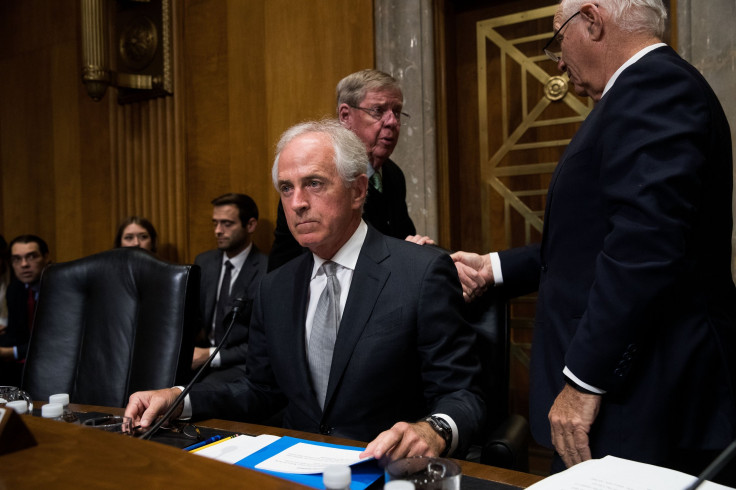Is Congress Trying To Take Away Trump's Executive Authority Over Nuclear Strikes?

Sen. Bob Corker (R-Tennessee) announced Wednesday that a “long overdue” hearing to discuss the president’s executive authority to use nuclear weapons will be held by the Senate Foreign Relations Committee (SFRC) next week.
Corker, who is a chairman of the committee and a critic of President Donald Trump, said in a statement that the Nov. 14 hearing would talk about “authorities of the legislative and executive branches with respect to war-making.”
“A number of members both on and off our committee have raised questions about the authorities of the legislative and executive branches with respect to war-making, the use of nuclear weapons, and conducting foreign policy overall,” Corker said
“This continues a series of hearings to examine these issues and will be the first time since 1976 that this committee or our House counterparts have looked specifically at the authority and process for using U.S. nuclear weapons,” he added in the statement. “This discussion is long overdue, and we look forward to examining this critical issue. ”
The questions Corker referred to were raised by lawmakers after Trump’s warning in August that North Korea would face "fire and fury like the world has never seen" if it continued to perform nuclear and missile tests.
A number of high-ranking Democrats and Republicans have expressed concern over the unilateral power the president possess to authorize a nuclear strike in the face of a potential war against the Asian country. Much of the concern seems to be stemming from their unease about Trump’s aggressive rhetoric against North Korea.
The doubts were reinforced by Corker in October when he said Trump was treating his office like “a reality show” issuing reckless threats that could set the nation “on the path to World War III.”
Other Democrats including Rep. Ted Lieu (D-California) introduced bills earlier this year that would require Congress to authorize the use of nuclear weapons and a declaration of war should Trump issue an order for a preemptive strike against North Korea.
Talking about the president's authority to go to war without consulting the Congress, Corker told NPR in September: "I've had other members talk with me a little about it, and we're doing some research on that topic." He added: "Every president since we've had nuclear weapons has had the ability to launch them.” That's the way our nation is."
Lieu’s bill titled Restricting First Use of Nuclear Weapons Act of 2017,which he co-authored, was introduced in House in January and prohibited the president from conducting a first-use nuclear strike. The bill defines "first-use" as “a nuclear weapons attack against an enemy that is conducted without the President determining that the enemy has first launched a nuclear strike against the United States or a U.S. ally.”
Lieu had told the Guardian that the best recruiter of Republican support for his bill was Trump’s behavior. “Every time the president does something erratic, which is every day, we get more co-sponsors,” Lieu said.
A similar legislation was launched by John Conyers (D-Michigan) in the House and Ed Markey (D-Massachusetts) in the Senate and it has two Republicans among the 61 backers in the House but no formal Republican backing in the Senate yet.
Doubting Trump’s competence, Sen. Ben Cardin (D-Maryland), the top Democrat on the SFRC, also said in an interview that the president was not allowed to nuke North Korea. “Congress has not authorized the use of force, so the president does not have the authority to preemptively use force,” Cardin said.
According to CNBC, some military professionals who were stunned by the president's aggressive rhetoric are scheduled to testify at Tuesday's hearing. One of them, Peter Feaver, a former director for Defense Policy and Arms Control at the National Security Council during the George W. Bush administration, had said last year that he views Trump as a potential threat to national security.
"In a crisis, for instance with a nuclear-armed North Korea, Trump's temperament could be problematic and could lead to dangerous escalation, whereas another President with better self-control might be able to manage it more safely," Feaver told the Duke University Chronicle in August last year.
Other witnesses include retired Air Force General Robert Kehler, a former commander of the U.S. Strategic Command and an expert in nuclear weapons and Brian McKeon, the former Acting Under Secretary for Policy at the Department of Defense under former President Barack Obama and a critic of Trump's approach to nuclear-armed North Korea.
© Copyright IBTimes 2024. All rights reserved.




















